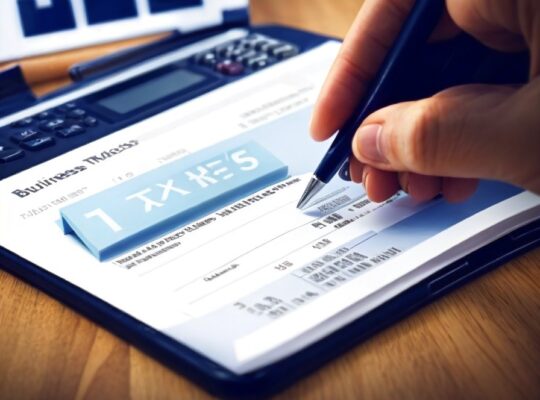Conquer Tax Season: How to Do Taxes for Your Small Business
Running a small business is an exciting adventure, but tax season can feel like a boss battle you dread. Fear not, fellow entrepreneur! This guide will equip you with the knowledge and steps to tackle your small business taxes with confidence.
Table of Contents:
- Understanding Your Business Structure: We’ll break down the different structures (sole proprietorship, partnership, S corporation, etc.) and how they affect your tax filing.
- Gathering Your Tax Arsenal: Learn what documents and records you’ll need to have on hand to breeze through your tax return.
- Choosing the Right Tax Form: No need to get overwhelmed! We’ll explain the most common forms used by small businesses and help you pick the perfect one.
- Tax Time: Let’s Do This!: We’ll walk you through the process of filling out your form, step-by-step.
- Tax Tips and Tricks: Master the art of deductions and discover strategies to make tax season a breeze.
Understanding Your Business Structure:
The first step is figuring out your business structure. This fancy term just means how your business is legally organized. Are you a solopreneur rocking the show by yourself (sole proprietorship)? Did you team up with a partner (partnership)? Perhaps you opted for an S corporation, which offers some tax advantages. Understanding your structure is crucial because it determines which tax form you’ll need to file.
Gathering Your Tax Arsenal:
Tax time is like a game, and you need the right tools to win. In this case, your tools are your business records! Gather bank statements, receipts, invoices, and anything else that documents your income and expenses. Categorizing them neatly will save you a ton of time and stress later.
Choosing the Right Tax Form:
Don’t worry, you won’t be stuck deciphering a mountain of paperwork. The IRS offers specific forms for different business structures. For instance, sole proprietorships typically use Schedule C, while S corporations use Form 1120-S. The IRS website (https://www.irs.gov/) has a handy tool to help you pick the right form for your business.
Tax Time: Let’s Do This!
Now that you’re armed with the right form and your tax arsenal, it’s time to fill it out! The specific instructions will vary depending on your form, but most will ask you to report your business income and expenses. Remember, the goal is to calculate your taxable income, which is the amount you’ll owe taxes on.
Tax Tips and Tricks:
Even superheroes need a good sidekick! Here are some tax tips to make your life easier:
- Keep meticulous records: This might sound obvious, but good recordkeeping is the foundation of stress-free tax filing.
- Embrace the power of deductions: There are many business expenses you can deduct from your income, lowering your tax bill. The IRS website has a comprehensive list of deductible expenses https://www.irs.gov/forms-pubs/guide-to-business-expense-resources.
- Consider estimated tax payments: If you expect to owe a significant amount of tax, making estimated tax payments throughout the year can help you avoid penalties.
- Don’t be afraid to ask for help: If things get too complex, consider consulting a tax professional. They can guide you through the filing process and ensure you’re taking advantage of all the deductions you deserve.
Remember, tax season doesn’t have to be a scary monster under the bed. With a little preparation and these helpful tips, you can conquer it like a champion!
Tips and Tricks for Small Business Tax Mastery (continued):
Conquering tax season is all about strategy and a little bit of finesse. Here are some additional tips to make you a tax-filing pro:
- Mileage Magic: If you use your personal car for business, you can deduct a portion of your mileage. The IRS standard mileage rate for 2024 is 65 cents per mile. Keep a detailed mileage log to track your business trips!
- Home Office Hero: Running your business from your home? You might qualify for the home office deduction. However, there are specific requirements, so be sure to research them carefully on the IRS website [invalid URL removed].
- Software Savvy: Consider using tax filing software designed for small businesses. These programs can streamline the process, guide you through deductions, and help you avoid errors.
- Stay Organized, Stay Sane: Develop a system for keeping your business receipts and documents organized throughout the year. This will save you a mountain of work come tax time. Use folders, digital storage solutions, or a combination of both.
- File Electronically: Ditch the paper chase! The IRS offers electronic filing options that are secure, fast, and can even notify you of any potential errors.
Bonus Tip: Friend or Foe? Understanding Estimated Taxes:
Estimated taxes are prepayments you make throughout the year to cover your tax liability. They’re crucial if you expect to owe a significant amount of tax come filing time. Not paying estimated taxes can result in penalties. However, there are exceptions to who needs to pay them. The IRS website has a helpful tool to determine if estimated taxes apply to you https://www.irs.gov/businesses/small-businesses-self-employed/estimated-taxes.
Remember: Don’t be afraid to seek help! If tax complexities leave you feeling lost, consider consulting a tax professional. They can provide personalized guidance and ensure you’re taking advantage of all the deductions and credits you deserve. By following these tips and tricks, you can transform tax season from a foe into a manageable friend. Now go forth, conquer your taxes, and get back to focusing on what you do best – running your awesome small business!
Sources
What if I’m not sure what business structure I am?
This is a common question! The structure you choose (sole proprietorship, partnership, LLC, S corporation, etc.) impacts how you file your taxes. The IRS website has a helpful tool to identify the right structure for your business [invalid URL removed].
What kind of records should I keep for tax purposes?
Save anything that documents your business income and expenses! This includes bank statements, invoices, receipts, and mileage logs (if you use your car for business). Keeping good records makes tax filing a breeze.
Do I need to pay estimated taxes?
Estimated taxes are prepayments made throughout the year to cover your tax bill. They’re important if you expect to owe a significant amount of tax. The IRS website has a tool to see if estimated taxes apply to you https://www.irs.gov/businesses/small-businesses-self-employed/estimated-taxes.
What are some common deductions for small businesses?
There are many! Some examples include business expenses like office supplies, software subscriptions, and marketing costs. You can even deduct a portion of your mileage if you use your car for business. The IRS website has a comprehensive list https://www.irs.gov/forms-pubs/guide-to-business-expense-resources.
What if I need help filing my small business taxes?
Don’t be afraid to ask for help! Tax professionals can guide you through the filing process, ensure you claim all the deductions you deserve, and answer any questions you may have.
What if I miss the tax filing deadline?
The IRS website has information on filing extensions if you need more time [invalid URL removed]. However, filing on time is always best to avoid penalties.
By understanding these FAQs and following the tips in this guide, you’ll be well on your way to a smooth and successful tax season for your small business!

